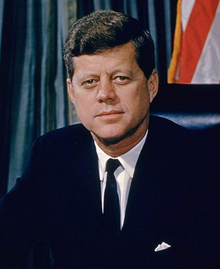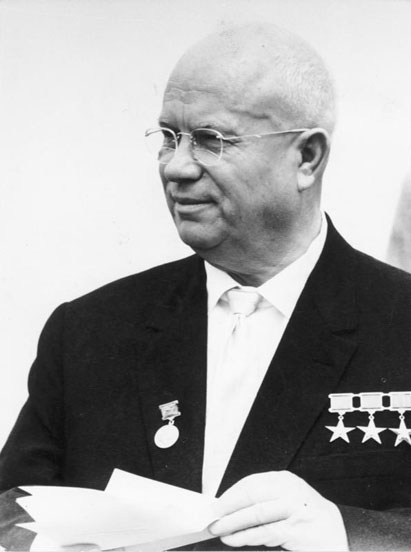Learn It
Background: Several international crises between the United States and the Soviet Union preceded the Cuban Missile Crisis. These events helped shaped different points of view that led up to the Cuban Missile Crisis.
One major event was the Communist Revolution in Cuba. Fidel Castro led the revolution and took control of Cuba. Castro had the support of Nikita Khrushchev, the First Secretary of the Central Committee of the Communist Party of the Soviet Union. The United States distrusted Castro and embarked on a policy to destabilize the Cuban government. In 1961, the United States government supported 1,400 Cuban exiles who attempted to invade and seize power in Cuba. This event became known as the Bay of Pigs Invasion. The failure of the invasion did not stop further efforts to destabilize the Cuban government.
Another major event was the Cuban Project, also known as Operation Mongoose. Operation Mongoose was a secret U.S. government program that included plans to destabilize the Cuban government and economy, and overthrow Fidel Castro.
These prior events helped shape the different points of view regarding the Soviet Union’s building of missile bases in Cuba, and the 13-day Cuban Missile Crisis.
An author uses the written word to share his or her point of view or perspective (opinions and beliefs).
Read the excerpts from letters written by President John F. Kennedy and Soviet Chairman Nikita Khrushchev during the height of the Cuban Missile Crisis.
After reviewing both excerpts compare the two authors’ points of view regarding the situation.
Day 7, Cuban Missile Crisis
…Moreover, the Congress [Organization of American States] adopted a resolution expressing its support of this declared policy. Despite this, the rapid development of long-range missile bases and other offensive weapons systems in Cuba has proceeded. I must tell you that the United States is determined that this threat to the security of this hemisphere be removed. At the same time, I wish to point out that the action we are taking is the minimum necessary to remove the threat to the security of the nations of this hemisphere. The fact of this minimum response should not be taken as a basis, however, for any misjudgment on your part…Source: U.S. Office of Historianopens in new window"
Day 9, Cuban Missile Crisis
Dear Mr. President,
Imagine, Mr. President, what if we were to present to you such an ultimatum as you have presented to us by your actions. How would you react to it? I think you would be outraged at such a move on our part. And this we would understand.
Having presented these conditions to us, Mr. President, you have thrown down the gauntlet. Who asked you to do this? By what right have you done this? Our ties with the Republic of Cuba, as well as our relations with other nations, regardless of their political system, concern only the two countries between which these relations exist. And, if it were a matter of quarantine as mentioned in your letter, then, as is customary in international practice, it can be established only by states agreeing between themselves, and not by some third party. Quarantines exist, for example, on agricultural goods and products. However, in this case we are not talking about quarantines, but rather about much more serious matters, and you yourself understand this…
- Excerpt from letter written by Chairman Nikita Khrushchev to President John F. Kennedy, October 24, 1962
Source: Library of Congress, Khruschev Letter to President Kennedyopens in new window"
Understanding the author's purpose or point of view helps you comprehend what you are reading. When different authors have different points of view about the same topic, it helps to compare and contrast their opposing points of view. Let's compare the two authors' points of view regarding the Cuban Missile Crisis. Note the excerpt from each letter that supports the point of view.
| President John F. Kennedy’s point of view | Chairman Nikita Khrushchev’s point of view |
|---|---|
 Image Credit: Pipesfe via Wikipedia CC BY-SA 3.0 |
 Image Credit: Bundesarchiv via Wikipedia CC BY-SA 3.0 |
The United States has the support of the western hemisphere to stop the building of the missile bases in Cuba. "…Moreover, the Congress [Organization of American States] adopted a resolution expressing its support of this declared policy." |
The United States has no right to make any demands on the Soviet Union and by doing so, the U.S. has challenged the Soviet Union. "Having presented these conditions to us, Mr. President, you have thrown down the gauntlet. Who asked you to do this? By what right have you done this?" |
The Soviet Union has continued with the building of missile bases in Cuba despite the objection of the members of the Organization of American States. "Despite this, the rapid development of long-range missile bases and other offensive weapons systems in Cuba has proceeded." |
The United States has no right to interfere with the relations between the Soviet Union and Cuba. "By what right have you done this? Our ties with the Republic of Cuba, as well as our relations with other nations, regardless of their political system, concern only the two countries between which these relations exist." |
The United States’ actions are to protect the security of the western hemisphere. "I must tell you that the United States is determined that this threat to the security of this hemisphere be removed." |
The United States has no right to impose a quarantine on goods coming from the Soviet Union to Cuba. "And, if it were a matter of quarantine as mentioned in your letter, then, as is customary in international practice, it can be established only by states agreeing between themselves, and not by some third party." |
The United States is taking what it considers a minimum action to protect the western hemisphere. "At the same time, I wish to point out that the action we are taking is the minimum necessary to remove the threat to the security of the nations of this hemisphere." |
Quarantines can only be established between agreeing nations. "And, if it were a matter of quarantine as mentioned in your letter, then, as is customary in international practice, it can be established only by states agreeing between themselves, and not by some third party." |
Minimum actions should not be viewed as weakness on the part of the United States. "The fact of this minimum response should not be taken as a basis, however, for any misjudgment on your part…" |
The United States’ action is more than imposing a quarantine between Cuba and the Soviet Union. "However, in this case we are not talking about quarantines, but rather about much more serious matters, and you yourself understand this…" |
As you can see in the chart, both men have very different perspectives regarding the Soviet Union’s building of long-range missile bases in Cuba. Kennedy views it as a threat to the Western hemisphere, while Khrushchev views it as a matter between Cuba and the Soviet Union and thus, other countries have no right interfering in their relationship.








